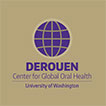In its November 2020 edition, Annals of Global Health published an opinion piece on creating oral health research capacity on low- and middle-income countries (LMIC). This is a remarkable opportunity for expanding advocacy for decreasing inequalities in global health. Below are relevant highlights.
 The COVID-19 pandemic has emphasized the social, economic, and health inequalities in our society, including existing global oral health inequalities. In the past, the NIH has focused on broadening the public health and medical research capacity present in low- and middle- income countries. There is a global shortage of dentist-scientists as well, especially in developing countries, such as Thailand. Investing in research in a recent project with the University of Washington (UW) DeRouen Center for Global Oral Health and the National Institute of Dental and Craniofacial Research (NIDCR) has not only impacted trainees’ career development but enhanced advancement of oral health research of South East Asia. The success of partnership calls for expanding oral health research training in other low-income countries.
The COVID-19 pandemic has emphasized the social, economic, and health inequalities in our society, including existing global oral health inequalities. In the past, the NIH has focused on broadening the public health and medical research capacity present in low- and middle- income countries. There is a global shortage of dentist-scientists as well, especially in developing countries, such as Thailand. Investing in research in a recent project with the University of Washington (UW) DeRouen Center for Global Oral Health and the National Institute of Dental and Craniofacial Research (NIDCR) has not only impacted trainees’ career development but enhanced advancement of oral health research of South East Asia. The success of partnership calls for expanding oral health research training in other low-income countries.
The UW, NIH and NIDCR partnered with 2 universities in Thailand to address the shortage of dentist-scientists all over the world who would advance research that impacts public health. At Thammasat University and Khon Kaen University, the Fogarty International Center Training Program in Clinical, Public Health and Behavioral Oral Health Research for Thailand has successfully trained over 200 individuals from 18 countries, bringing Thailand to the international forefront of oral health research.
The program employed curricula in short-, medium-, and long-term instruction to provide research training. From a 5-day seminar, including education on levels of evidence in evidence- based clinical research, to a yearlong research program at the UW, the curricula provide a broad and applicable introduction to careers in clinical research.
While Thailand is the only NIH funded training site for oral health, we hope that the success of this program can be replicated in other LMIC like Peru and Kenya.
